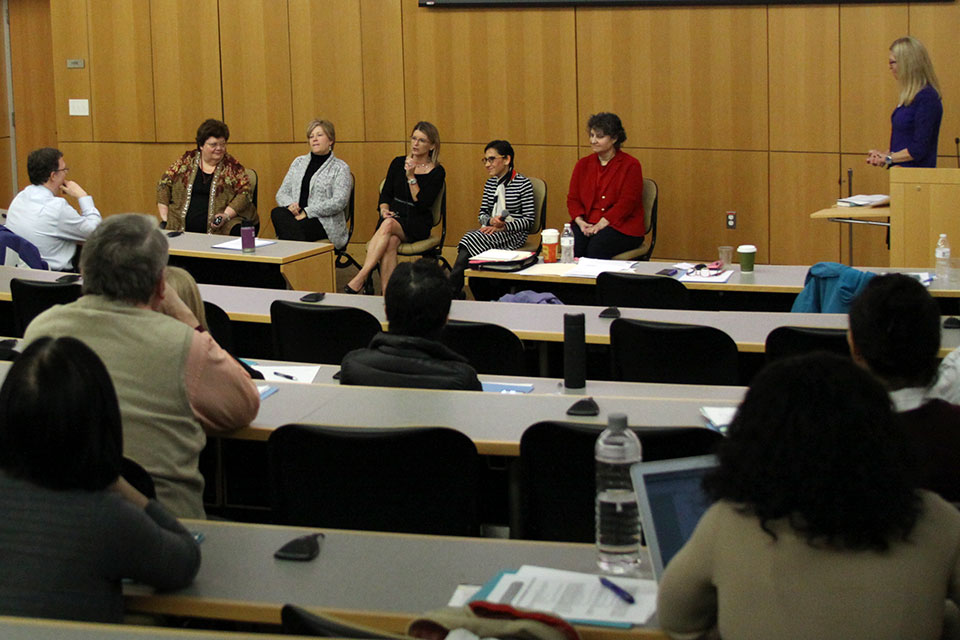PHARMACY SEMINAR BRINGS THE PAIN
Written By: Max Ditlevson, Elias Inscoe, Rachel Lumish, Joseph Martin, and Pamela Younes, Fourth-Year Student Pharmacists
The School of Pharmacy’s Peter Lamy Center on Drug Therapy and Aging and Palliative Care Collaborative hosted a half-day seminar on Jan. 11. Titled “Pain in Older Adults and the End-of-Life: Opening Pandora’s Box,” the seminar brought together pharmacists, physicians, residents, nurses, social workers, and students to discuss pain — sometimes referred to as the “fifth vital sign” — in older adult populations. Learning how to best manage pain for these vulnerable patients is vital for all health care professionals and students, as appropriate pain management for this population is often seen as an onerous task.
Setting the Stage
The seminar began with an introduction from Nicole Brandt, PharmD, MBA, BCPP, BCGP, FASCP, professor in the Department of Pharmacy Practice and Science (PPS) and executive director of the Lamy Center, who thanked the event sponsors, including the Geriatrics and Gerontology Education and Research Program (GGEAR) at the University of Maryland, Baltimore (UMB), Gilchrist, Johns Hopkins Geriatric Workforce Enhancement Program (JHGWEP), and Seasons Hospice. During the first session, Dr. Brandt and her co-presenter Linda Simoni-Wastila, BSPharm, MSPH, PhD, the Parke-Davis Chair in Geriatric Pharmacotherapy in the School’s Department of Pharmaceutical Health Services Research (PHSR) and director of research for the Lamy Center, spoke about the struggle to balance pain management with the risk of opioid diversion in older adults. They dispelled the myth that substance use disorders solely affect the young adult population and discussed how older adults are typically excluded from clinical research trials, which greatly limits the amount of objective, peer-reviewed data that clinicians can apply to that population. Though the academic literature concerning older adults and substance use disorder is sparse, it was encouraging to learn that the Lamy Center is actively analyzing Medicare data to delve into this problem.
Passionate Presentations
In the second session, Danielle Doberman, MD, MPH, a hospice and palliative medicine specialist at Johns Hopkins Hospital, challenged audience members to engage patients in decisions about their own pain management. She introduced the “Ask, Tell, Ask” method that is being utilized for informed consent in certain fields. This technique allows health professionals to use their clinical expertise to guide treatment, but ultimately leaves the final care decisions to the patient. By doing so, you are able to achieve realistic pain management goals and build trust with your patient.
Patient care plans are required in the long-term care setting, so Barbara Resnick, PhD, RN, CRNP, FAAN, FAANP, professor in the Department of Organization Systems and Adult Health at the School of Nursing, discussed how to motivate staff to incorporate pain management into practice. The final speaker of the day, Mary Lynn McPherson, PharmD, MA, MDE, BCPS, CPE, professor and executive director of advanced post-graduate education in palliative care in PPS, guided the participants through an interactive evaluation of the risks and benefits of different pharmacologic agents for pain. The morning wrapped up with a thought provoking town hall discussion moderated by Barbara Zarowitz, PharmD, FCCP, FCCM, BCPS, BCGP, FASCP, geriatric pharmacotherapy and clinical research consultant for the Lamy Center, concerning the challenges faced by health care professionals in pain management, gaps in research, and the troubling lack of treatment options for older adults struggling with substance use disorders.
Knowledge Gained and Future Aims
The opportunity to network with a wide variety of professionals was a welcome component of the seminar. This event allowed for a melting pot of interprofessional attendees who, while coming from different academic backgrounds, were all passionate about caring for older adults. This made for a truly meaningful experience, as each attendee brought a unique viewpoint to the collective goal of understanding and optimizing medical treatment for older adults.
As “Pandora’s Box” was opened during the seminar, unique ways to consider and describe pain were revealed. While many realize that there are functional impacts of pain, far less understand or even recognize the emotional aspect of pain. Far too often, pain is thought of as an acute process, such as a simple stubbed toe. However, pain is truly a multicomponent experience, which can carry tremendous implications for a patient’s emotional well-being. This was a powerful emphasis that demonstrated the Lamy Center’s dedication and drive to improving not only the treatment, but also the conceptualization of pain.
The Lamy Center and the Palliative Care Collaborative both continue to educate health professionals and students to meet the needs of an aging population. The Center is dedicated to improving drug therapy for aging adults through innovative research, education, and clinical initiatives. Overall, it is important that we continue to advocate for legislation related to care of aging adults, establish methods to overcome current barriers, and establish partnerships among health care professionals when tackling the topic of pain in this vulnerable population.
This event was just the first of a series of planned seminars to highlight these topics. If you are interested in learning more about the Lamy Center and the Palliative Care Collaborative, or about upcoming events, please visit the Lamy Center website or email Dr. Brandt at nbrandt@rx.umaryland.edu.

